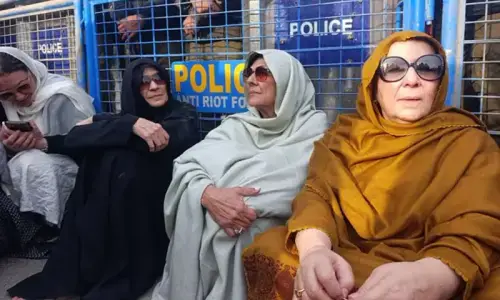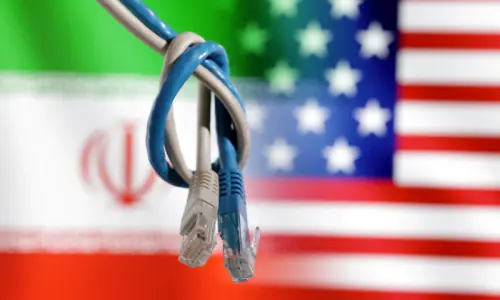In a landmark verdict that will change the course of the country’s political history, the Supreme Court on Friday ruled that disqualification handed down under Article 62 (1)(f) of the Constitution is for life.
According to DawnNewsTV, the verdict was issued unanimously by all five judges of the bench.
Article 62(1)(f), which sets the precondition for a member of parliament to be "sadiq and ameen" (honest and righteous), is the same provision under which former prime minister Nawaz Sharif was disqualified by a five-judge SC bench on July 28, 2017, in the Panama Papers case. Likewise, Pakistan Tehreek-i-Insaf (PTI) leader Jahangir Tareen was disqualified on Dec 15 last year by a separate bench of the apex court under the same provision.
Following the verdict, both Sharif and Tareen have been deemed ineligible to hold public office till the courts' respective declarations against them hold.
Related: 'Disqualification under Article 62 (1)(f) is for life but not applicable in my case,' says Tareen
The decision, read out by Justice Umar Ata Bandial, stated that the disqualification of any member of parliament or a public servant under Article 62 (1)(f) in the future will be “permanent”. Such a person cannot contest elections or become a member of parliament.
Chief Justice Mian Saqib Nisar, who was heading the bench, remarked before the verdict was announced that the public deserves "leaders of good character".
"The restriction imposed by Article 62 (1)(f) of the Constitution for the eligibility of a candidate for election to Parliament serves the public need and public interest for honest, upright, truthful, trustworthy and prudent elected representatives," reads the judgement.
Read the complete SC judgement here.
It says the judicial mechanism in Article 62 (1)(f) grants a fair opportunity for relief to a candidate under challenge to vindicate himself.
"Therefore, the permanent incapacity of a candidate for election under Article 62 (1)(f) of the Constitution is not an arbitrary, excessive or unreasonable curtailment of his fundamental right under Article 17(2) of the Constitution."
"In the result, we are inclined to hold that the incapacity created for failing to meet the qualifications under Article 62 (1)(f) of the Constitution imposes a permanent bar which remains in effect so long as the declaratory judgment supporting the conclusion of one of the delinquent kinds of conduct under Article 62 (1)(f) of the Constitution remains in effect."
The court also directed that all 17 appeals and petitions challenging the length of disqualification under Article 62 (1)(f) for possessing fake degrees be fixed before appropriate benches "for decision in accordance with the law laid down in this judgment, keeping in view the respective facts and circumstances of each case".
We can only interpret the Constitution: judge
Justice Sheikh Azmat Saeed, a member of the bench who wrote an additional note in the judgment, observed that while a period of disqualification was specified in certain sub-articles of Article 63 of the Constitution, such a sunset clause is not found in Article 62(1)(f) because the framers of the Constitution chose not to do so.
Addressing the concern by some counsels of the petitioners that the lifetime ban resulting from Article 62 (1)(f) "may be disproportionate and a little harsh", Justice Saeed maintained that such arguments were more suitable to be held in the parliament, rather than before the court.
"This aspect of the matter is rather ironic as several persons before us were or had been the Members of Majlis-e-Shoora (Parliament) at some point of time and may have passed the amendments, which now stand in their way," he wrote.
"We [...] can only interpret the Constitution, not amend or change it," the judge emphasised.
'The decision will have political implications'
Senior journalist Mazhar Abbas, while commenting on the SC verdict, said that the judgment will have political implications.
"Nawaz Sharif will intensify his narrative and it will be difficult for [PML-N president] Shahbaz Sharif to take a different line from the one being taken by [his brother]," he said.
Read: PML-N terms SC verdict on lifetime disqualification a 'joke, conspiracy'
Abbas added that the timing of today's verdict and the judgement yet to be announced by the accountability court will decide PML-N's tone for the upcoming general elections.
"The crises will be deepened [within PML-N] if Shahbaz Sharif keeps his tone soft."
'Nawaz brought this upon himself'
Meanwhile, PPP leader Khursheed Shah, while speaking to reporters, said that the apex court's verdict is in line with the Constitution.
He said the PPP had repeatedly told Nawaz Sharif to let parliament decide the fate of politicians, "but he did not listen and went to the Supreme Court".
"Nawaz Sharif himself supported Article 62 and he has been caught in his own trap," Shah claimed, adding that Articles 62 and 63 could have been eliminated in the 18th Amendment but Sharif did not agree to do so.
PPP chairman Bilawal Bhutto-Zardari chairman in a tweet said that PML-N and PTI "forced the judicialisation of politics".
"I am of the belief that the people of Pakistan should make such decisions about the fate of politicians. Unfortunately, it is PTI & PMLN themselves who have forced the judicialisation of our politics. Na-ehal Nawaz & Tareen must now face the consequences of their actions."
'Question should be left to parliament'
A five-judge bench ─ headed by CJP Nisar and comprising Justice Sheikh Azmat Saeed, Justice Umar Ata Bandial, Justice Ijazul Ahsan and Justice Sajjad Ali Shah ─ had on February 14 reserved the judgment on 17 appeals and petitions challenging the length of disqualification under Article 62(1)(f) for possessing fake degrees.
At the last hearing, Attorney General Ashtar Ausaf had told the bench that it was not the function of the courts to say that the disqualification under Article 62(1)(f) of the Constitution was for life or to provide a timeline for disqualification. The question should be best left for parliament to decide, he had argued.
The AG had also emphasised that the provision did not determine the length of disqualification, adding that the court would have to look into the matter on a case-to-case basis.
Read: Do Articles 62 and 63 require reforming?
Past precedents
Though there was no clear determination about the length of disqualification in Article 62 (1)(f), former chief justice Iftikhar Mohammad Chaudhry had held in the 2013 Abdul Ghafoor Lehri case that under Article 63, there were certain disqualifications which were of temporary nature and a person disqualified under Article 63 could become qualified after the lapse of a certain period.
However, his verdict had held that disqualification under Article 62 was of a permanent nature and a person had to fulfill certain qualifications/conditions to become eligible to be elected or chosen as a member of parliament. Thus Article 62 did not provide any period after which a person, who was declared disqualified under this article, could be eligible to contest the elections, it said.
Former prime minister Yousuf Raza Gilani was disqualified on June 19, 2012 from holding a seat in parliament for committing contempt of the court on moral turpitude in terms of Article 63 of the Constitution which specifies disqualification for a period of five years.
Legal observers say the Supreme Court has handed down different verdicts on the disqualification of legislators like in the case of Iftikhar Ahmed Cheema who was de-seated in 2015 from the NA-101 constituency for concealing assets. Subsequently, he contested the by-election and regained his seat.
But in the case of Rae Hassan Nawaz, the apex court disqualified him under Article 62(1)(f). Likewise, the court allowed Jamshed Dasti to contest the election, but disqualified Rizwan Gill, Samina Khawar Hayat and Amir Yar under Article 62(1)(f) of the Constitution.


































